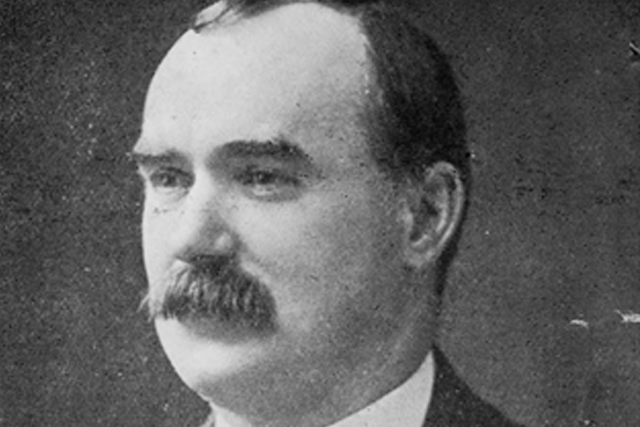By Pauline Murphy
This year marks the 150th birthday of trade union leader and 1916 martyr James Connolly. He was born at 107, Cowgate, Edinburgh, Scotland on the 5th June, 1868, the third son of Monaghan natives John Connolly and Mary McGinn.
Cowgate was known as “Little Ireland” due to the heavy population of Irish people living in that part of Edinburgh’s Old Town. Cowgate achieved its name from busy market days, when cattle were driven through its streets from the countryside.
The streets of Cowgate were at a lower level than others and it was only a stones throw away from the city’s prestigious university, even though the majority of Cowgate’s inhabitants were illiterate. That could not be said of the Connolly family. They were a family who were able to read and write and unlike so many other dwellers of Cowgate’s slums, the Connollys were in employment.
James Connolly’s parents were wed in St. Patrick’s Church in Cowgate in 1856. His mother was employed as a domestic servant while his father worked for the city corporation collecting horse manure from the streets. James Connolly was the youngest in a family of three boys. His eldest brother, John joined the British Army and served in India while his other brother, Thomas worked in the printer at the Edinburgh Evening Post.
Even though the Connollys were a literate family in employment, they still suffered the hardships of tenement living. At the time of James Connolly’s birth in Cowgate, over 14,000 Irish people were crammed into the area. Health issues greatly affected tenement dwellers in Cowgate. Connolly’s mother suffered from bronchitis and had to retire early from her domestic servant duties. She died in 1891 at the age of 58, when she succumbed to the illness that had plagued her for decades. Young James developed rickets due to vitamin deficiency and it later contributed to what writer Sean O’ Casey described as “rather awkward carriage”; bow legs, a waddle to his walk.
When James’ father was promoted to lamplighter for the streets of Edinburgh, the family moved to slightly improved living conditions at High Street, but when he suffered an accident at work, James’ father was demoted back to collecting manure and the family moved to Grasssmarket, Kingstables.
Starting work at an early age
James went to school at St. Patrick’s and at the age of 11 his schooling came to an end, when he found employment at the same place where his brother, Thomas worked. Young James Connolly was tasked with cleaning ink from the printing machines. One day, a factory inspector found James hard at work and when he asked him his age he instantly lost his job; his employers were breaking the law by employing someone so young!
James found work again at the age of 13, when he was employed as a baker’s apprentice. He did not stay long and moved to a position in a mosaic tile factory.
At the age of 14, James decided to follow his older brother’s footsteps and joined the British Army. He lied about his age and enlisted in the Kings Liverpool Regiment. His first post would see him set foot on Irish soil for the first time, when he landed in Cork to guard Fenian prisoners at Spike Island Prison. Decades later, James would find himself in the role of Irish Freedom Fighter and fight against the uniform he once wore.
James’ father died in 1990 from a cerebral hemorrhage. His brother, Thomas had emigrated to the United States while his other brother, John had returned from India and settled back in Edinburgh, where he worked in the city corporation. His involvement in Labour politics resulted in his dismissal from the corporation and he went back into uniform with the Edinburgh City Artillery.
In 1913, James Connolly was speaking at a rally in Dundee, when his brother John appeared in his army uniform. After delivering a fiery speech against imperialism, James had a few stern words for his brother, who was sporting the Imperial uniform! In a sad twist of fate, John died just a week after the execution of his brother in Kilmainham in 1916 and while James’ body was thrown into a quick lime grave in Arbour Hill, John was given a funeral with military honours in Edinburgh.
The place of James Connolly’s birth, Cowgate, is no longer and Irish ghetto. Today, those cobbled streets play host to a number of pubs and clubs. Once a byword for tenement living, Cowgate is now linked with nighttime entertainment.
107, Cowgate no longer exists but the site is marked by a plaque which describes its former history making son – “To the memory of James Connolly. Born 5th June, 1868 at 107, Cowgate. Renowned international trade union and working class leader. Founder of the Irish Socialist Republican Party member of Provisional Government of the Irish Republic. Executed 12th May at Kilmainham Jail, Dublin.”

